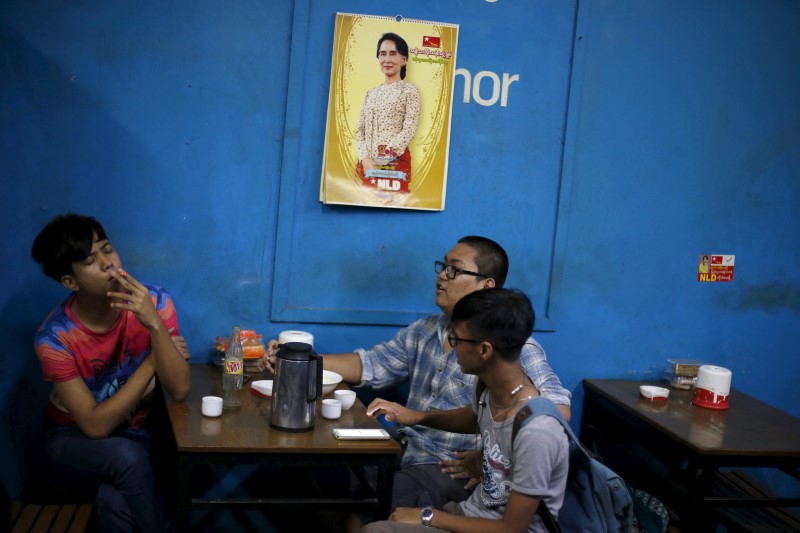By Joel Schectman and Yeganeh Torbati
WASHINGTON (Reuters) - The United States is temporarily easing trade restrictions on Myanmar by allowing all shipments to go through its ports and airports for six months, an effort to boost the Southeast Asian country's opposition party after its landmark election win in November, U.S. officials said on Monday.
The policy change, coming after Aung San Suu Kyi's National League for Democracy (NLD) won a landslide victory last month in Myanmar's first nationwide free elections in 25 years, applies even to ports and airports controlled by entities on the U.S. sanctions blacklist, the officials said.
To bolster Myanmar's transition to democracy after decades of military rule, U.S. officials began lifting sanctions against the country after a civilian government was formed in 2011. But officials acknowledged on Monday that remaining U.S. sanctions against those with ties to Myanmar's military have had the unintended consequence of halting "many, many dozens" of shipments.
Reuters reported last month that major U.S. banks, such as Citigroup (N:C), Bank of America (N:BAC) and PNC Financial (N:PNC) were shying away from backing Myanmar trade after discovering that the Asia World port – one of the country's most important shipping terminals - is controlled by a businessman on America's sanctions blacklist.
Exporters use trade finance from banks to ensure they get paid after shipments arrive, and the banks' withdrawal has led to a sharp decline in U.S. shipments into Myanmar.
"It was beginning to escalate," said a senior U.S. official. "Not only U.S. banks but also third country exporters and third country financial institutions were beginning to hold up trade going into and out of Burma," the official said, using another name for the country of 51 million people.
Officials cautioned that while the policy shift allows financing of shipments through blacklisted trade hubs, banks are still barred from doing business directly with the banned firms.
A second senior administration official said Monday's move would lend a boost to Suu Kyi's party, and was "potentially the single most important thing that we can do on the economic front immediately to give the NLD some breathing space over the next several months as it forms its government."
The official said the banks' freeze on much of Myanmar's trade with the West was most punishing on regular Myanmar citizens.
"You can think of the Burmese rice farmer who is trying to get some rice out" of the Asia World port, the official said.
"The trade transaction is held up and the rice ends up rotting in the docks."
Years after the U.S. began to lift its near-total ban on trade with Myanmar, more than a hundred people and companies remain on the U.S. sanctions blacklist, some of them the country's biggest economic players, creating a minefield for Western businesses seeking to profit from the new openings.
"The U.S. has been very much a proponent of U.S. businesses entering and increasing trade and economic ties," said Peter Kucik, a former senior sanctions advisor at the U.S. Treasury Department. "Impediments like this really need to be dealt with quickly and efficiently to make sure they don't undermine that very intention."
U.S. officials said they would likely consider an extension of the sanctions relief in several months.

"There's no question businesses would like a longer license ... but while this window is not ideal from a business perspective, for now it substantially addresses the challenge," said Peter Harrell, who advises businesses on entering markets under sanction. "Now you know you will be able to ship into the country for at least six months."